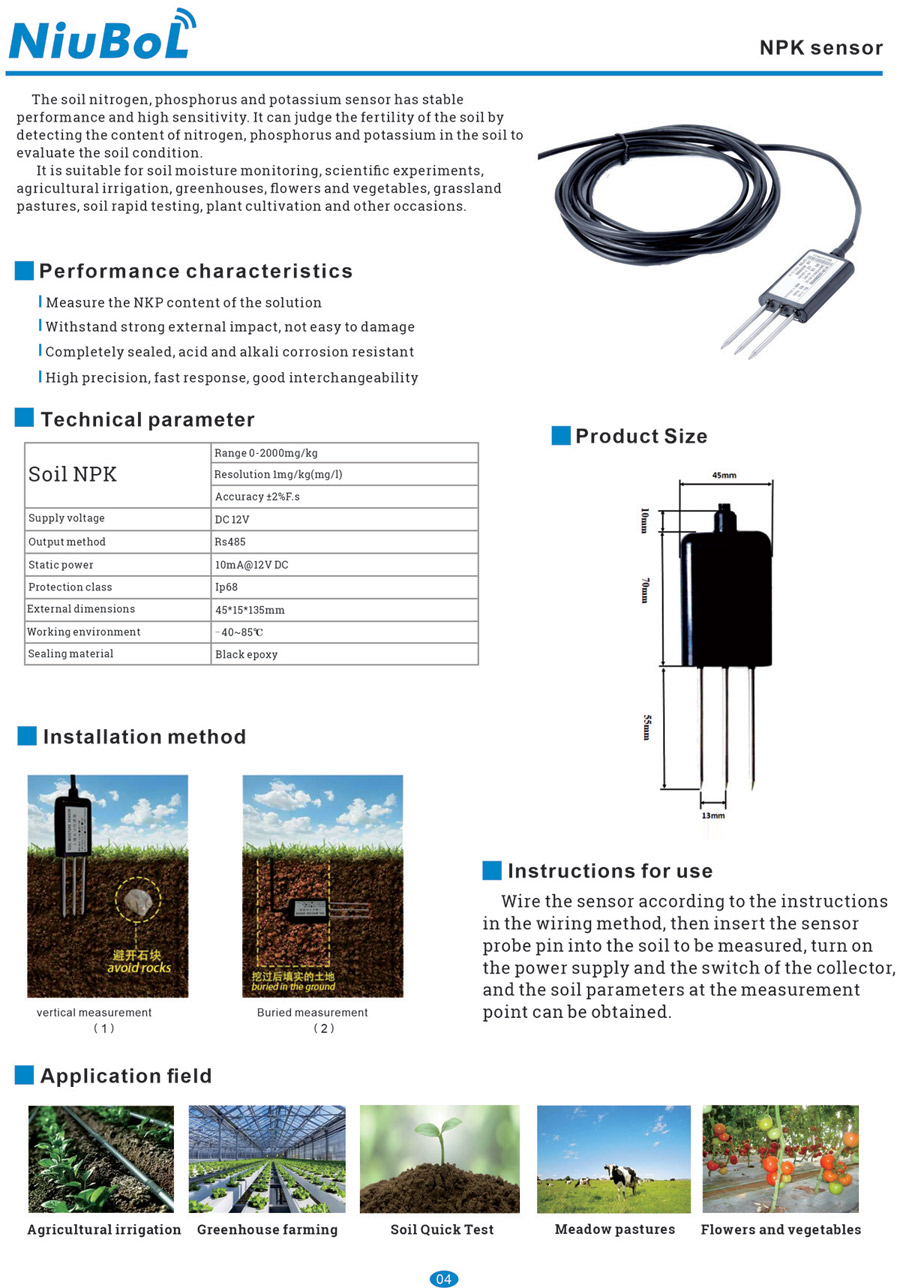

— Blogs —
—Products—
 Consumer hotline +8618073152920
Consumer hotline +8618073152920 WhatsApp:+8615367865107
Address:Room 102, District D, Houhu Industrial Park, Yuelu District, Changsha City, Hunan Province, China
Product knowledge
Time:2022-05-09 19:35:44 Popularity:1999
For soil, people generally use soil-based sensors for monitoring according to their needs. What types of soil sensors are available?
Soil ph sensors
Soil ph value represents soil pH, its level not only affects the ionic form and effectiveness of large and trace elements in the soil, but also has a significant impact on the life activities of microorganisms in the soil, too low or too high pH will affect nutrient absorption.
The soil ph sensor consists of a combination of a metal sensor and a functional value switching device. The metal sensor, as the core hardware system, is in direct contact with the soil during detection and uses the oxidation reaction in the chemical reaction to generate an electric current. The size of the current value drives the different ph value unit data corresponding to the ammeter, which is converted by the host and shows the value directly to people.
Soil moisture is the water content of the soil and is the most important and commonly used soil information. It is the basis for scientifically controlling and regulating the very condition of the soil, for water-saving irrigation, for scientific water use and for irrigation automation. The soil structure and the spatial variability of soil moisture cause the soil water content to vary in the same plot, which requires the measurement of soil water content.
Soil moisture sensors, also known as soil moisture sensors, work with temperature, light, acid and salt sensors, and then are connected to a computer to enable analysis and research of crop growth, thus controlling crops to always grow under the right environmental conditions.
Soil moisture sensors can also measure temperature, humidity, and conductivity.
Soil temperature is an important environmental factor for direct or indirect plant growth and development and is one of the most important parameters for soil monitoring. It affects a series of physical, chemical and biochemical processes in the soil and is closely related to crop growth, development and physiological processes. According to research, soil temperature affects the physiological processes, external morphology and internal structure of crops, and is a direct guide to the early and late sowing of crops, and is also an important parameter and basis in the process of ecological modeling and soil classification. Currently, soil temperature is measured and forecasted by contact, non-contact and analog methods.
Soil temperature and humidity sensors
Soil temperature and humidity sensors are a combination of soil temperature sensors and soil humidity sensors. Soil temperature and humidity monitoring allows us to understand the soil conditions in a timely manner, analyze the soil drought and flood conditions and the impact on crop growth and development, help traditional agriculture to transform into modern agriculture, and promote the development of "smart agriculture". In addition, based on the measured soil temperature and humidity data, we can predict floods, droughts and other natural disasters in time to help protect and build the ecological environment.
In addition to soil temperature and humidity sensors, there is also a tube type soil moisture monitor using the TDR measurement method. Based on the principle of dielectric constant, this sensor can monitor soil temperature and humidity at different levels in real time, realize dynamic observation of moisture content in each soil layer and visualization of soil salt accumulation, and can monitor soil temperature and humidity at different soil layers, quickly and accurately. Soil parameter quick testers are widely used in soil testing in smart agriculture, orchard nursery, demonstration park, smart city and other fields.
Nitrogen, phosphorus and potassium are essential elements for plant growth and development, and are also the three elements with the highest consumption requirements. In the soil, nitrogen, phosphorus and potassium are basically in the form of organic compounds, while they are returned to the soil in small amounts through residues and roots, and cannot be used directly by plants. In agricultural production, the effective nitrogen, phosphorus and potassium content is an important indicator to measure soil fertility and guide production.

Advances in technology have led us to now have a wider choice of soil sensor types. Not only can we choose a sensor that combines soil water content, electrical conductivity and temperature, but we can also choose a soil sensor that can monitor moisture, temperature and humidity, PH, nitrogen, phosphorus and potassium, and electrical conductivity at the same time. I believe that with the development, soil sensors will become more and more intelligent, and our choices will be more diversified.
Related recommendations
Sensors & Weather Stations Catalog
Agriculture Sensors and Weather Stations Catalog-NiuBoL.pdf
Weather Stations Catalog-NiuBoL.pdf
Related products
 Combined air temperature and relative humidity sensor
Combined air temperature and relative humidity sensor Soil Moisture Temperature sensor for irrigation
Soil Moisture Temperature sensor for irrigation Soil pH sensor RS485 soil Testing instrument soil ph meter for agriculture
Soil pH sensor RS485 soil Testing instrument soil ph meter for agriculture Wind Speed sensor Output Modbus/RS485/Analog/0-5V/4-20mA
Wind Speed sensor Output Modbus/RS485/Analog/0-5V/4-20mA Tipping bucket rain gauge for weather monitoring auto rainfall sensor RS485/Outdoor/stainless steel
Tipping bucket rain gauge for weather monitoring auto rainfall sensor RS485/Outdoor/stainless steel Pyranometer Solar Radiation Sensor 4-20mA/RS485
Pyranometer Solar Radiation Sensor 4-20mA/RS485
Screenshot, WhatsApp to identify the QR code
WhatsApp number:+8615367865107
(Click on WhatsApp to copy and add friends)
